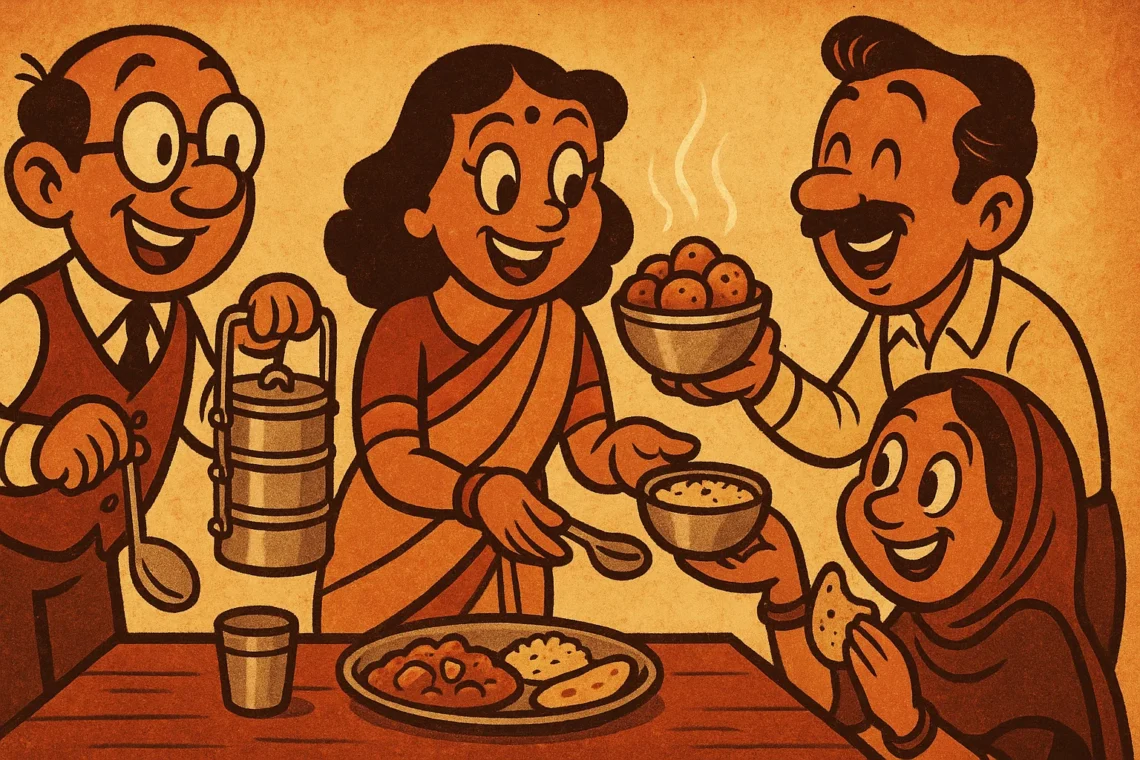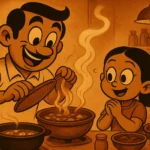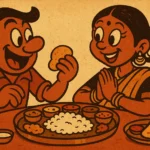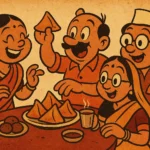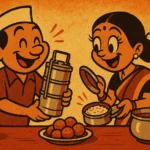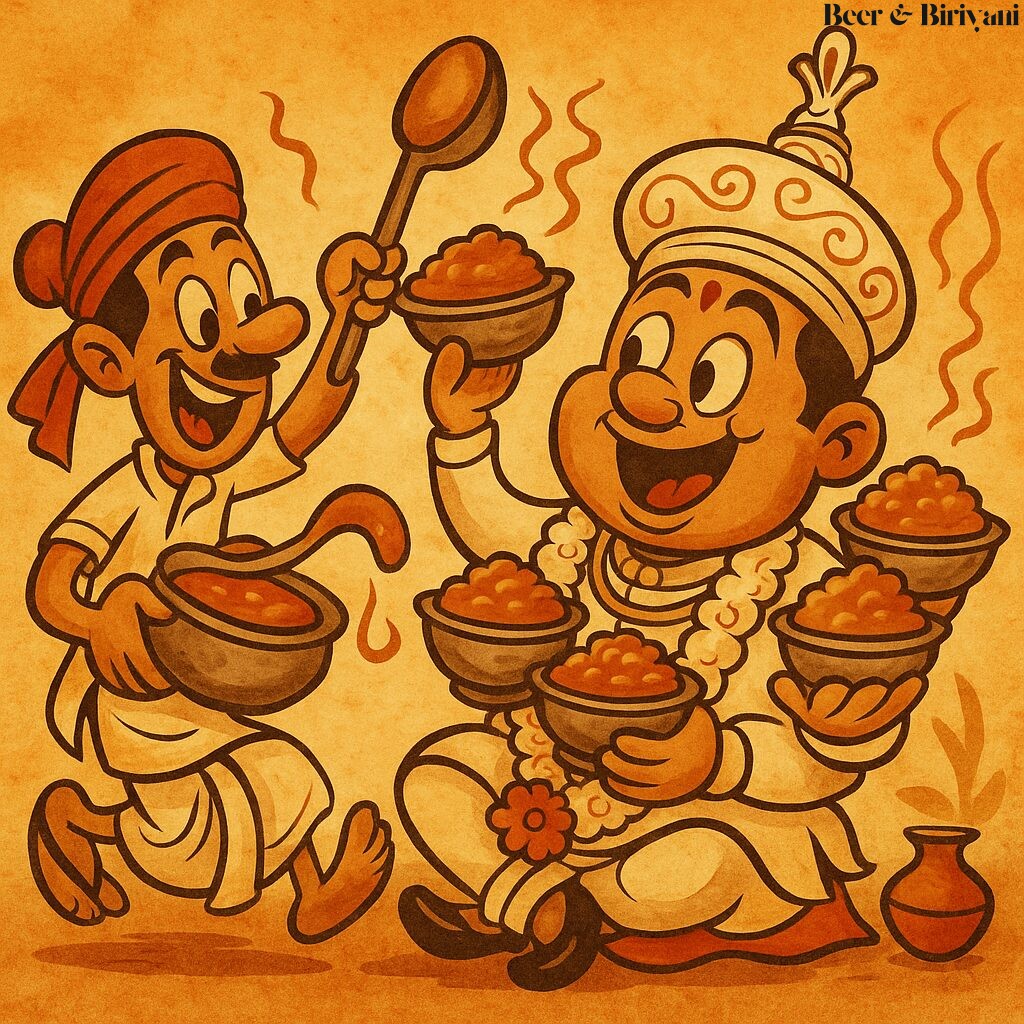In most workplaces, alliances are formed over coffee, in hurried elevator chats, or through cautiously exchanged LinkedIn endorsements. But if you’ve worked in an Indian office long enough, you know that real trust — the kind that can survive missed deadlines and passive-aggressive emails — is built at lunch. More specifically, over the opening of dabbas.
No onboarding document prepares you for it, but the ritual is unmistakable. Around 1 PM, the keyboards slow down. Browsers switch from Excel sheets to Zomato menus. And then, like clockwork, the smell of tadka begins to float through the air — mustard seeds, hing, jeera — announcing that lunch has begun. Not just eating, but *sharing*. Because in an Indian office, your dabba is never just your own. It’s a tiny piece of your home, your habits, your mother’s Sunday prep — opened and offered with quiet pride.
The First Lunch Is a Test
I remember my first day at my first job in Mumbai. Nervous, overdressed, and completely unsure of whether to eat at my desk or join the lunch table. A kind-looking woman named Anita beckoned me over and said, “You’ve brought dabba, right?” I nodded and pulled out my two-tier steel container. She smiled and passed me a spoonful of her rajma. “Try this,” she said. “Mine has less tomato than usual. You tell me if it’s okay.”
That was it. The gates had opened. By Day Three, I was part of the dabba circle — passing rotis, negotiating for bites of paneer, offering up my mother’s aloo bhindi with the kind of politeness usually reserved for heirlooms. Everyone had their signature dish. Ramesh’s wife made the softest parathas. Fatima’s chicken curry was famous two cubicles over. And I? I became the guy with the pickles. Homemade, too spicy, rationed carefully, but always in demand.
Dabba as Identity
In a workplace full of performance reviews and daily targets, your dabba becomes something simpler, more honest. It’s your background, your spice tolerance, your lunchtime generosity, and your ability to both give and ask. Someone always brought curd. Someone always brought salad. Someone forgot their dabba and survived on bites from everyone else’s — never judged, only fed.
There was an unspoken dabba diplomacy. If someone was upset with you, they might not make eye contact during lunch. If you were forgiven, a second roti was quietly offered. Promotions were celebrated with boxes of sweets slid onto the table. Resignations came with final lunches that felt like farewells with food. “Take another piece of paneer, you won’t get this after I leave,” someone would say, only half-joking.
The Politics of Sharing
Of course, not all dabbas were created equal. There were the reluctant sharers — who’d bring fancy pastas in sleek plastic boxes and pretend they weren’t hungry. There were also the heroes who packed extra chapatis just because “kal ka baingan thoda zyada ho gaya tha.” The dabba lunch was a democracy, but it had a soft caste system: vegetarians sat together, non-veg lovers whispered their biryani options carefully, and the ones with home-cooked food were gently envied by the takeaway crowd.
But despite all that, everyone had a seat. Even if your dabba only had two dry rotis and a bit of achaar, you were part of the table. Your presence meant someone would lean over and say, “Thoda le lo yaar, bahut bana liya.” And that — more than any appraisals or bonuses — made you feel like you belonged.
Now That I Lunch Alone
These days, I work from home in Austin. My lunch break is usually solo — leftovers reheated, eaten while scrolling through emails. There’s no waft of sambhar from a neighboring desk, no polite battle over the last papad, no surprise peda in a colleague’s tiffin because it was their kid’s birthday yesterday.
Sometimes, I pack a dabba anyway. Not because I need to carry it anywhere, but because it helps. It makes me feel anchored. I sit down, open my steel container, and eat slowly, imagining that someone beside me might ask, “Yeh khud banaya?” And I’d nod and say, “Haan, thoda zyada mirchi ho gaya hai.”
The Unseen Teamwork
Dabba diplomacy isn’t just about food. It’s about sharing small parts of yourself in bite-sized pieces. It’s about generosity without grandeur. It’s the taste of someone else’s kitchen, someone else’s routine, someone else’s care — offered to you, quietly, at lunchtime.
So if you’re ever the new person in an Indian office, and someone hands you a spoon and says, “Taste this, I made it differently today,” say yes. Because in that moment, you’re being invited to more than just a meal. You’re being let in. One roti at a time.
Born in Mumbai, now stir-frying feelings in Texas. Writes about food, memory, and the messy magic in between — mostly to stay hungry, sometimes just to stay sane.

